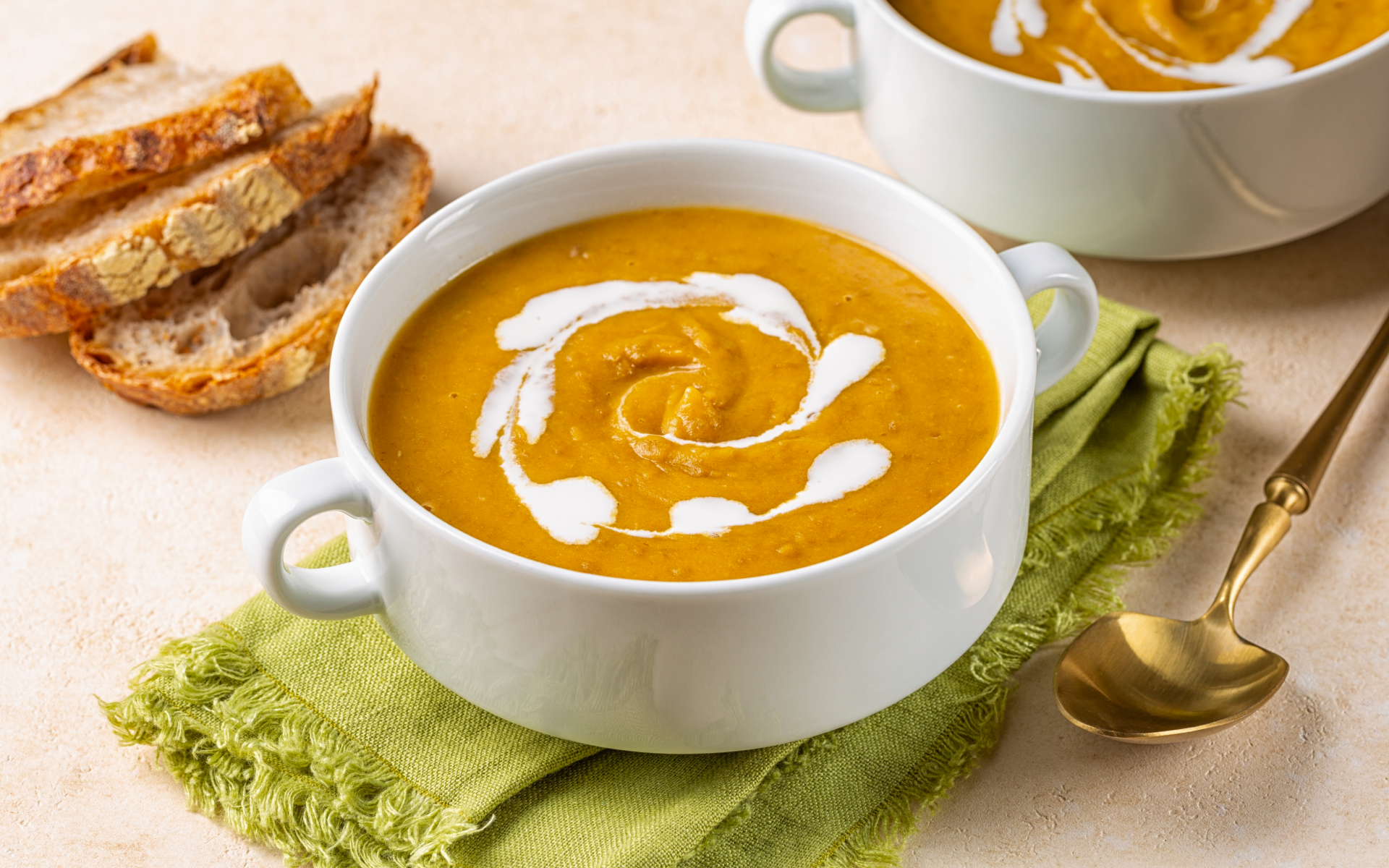Sugar is one of the most common ingredients in diets and is found in everything from your morning cup of coffee to the dressing on your dinner salad.
For many, the realization that their diet is high in added sugars comes as a surprise. Without knowing, (because added sugars are not always listed as “sugar” on food labels) they consume an alarmingly high amount of sugar every day.
Recent statistics have indicated a staggering increase in global sugar consumption, likely contributing to various health issues such as diabetes, obesity, and heart diseases (15).
A no-sugar diet may be the key to reversing these alarming trends, offering a path toward improved well-being and vitality. Here’s what you need to know to get started on this life-changing dietary adjustment.
What Is the No-Sugar Diet?
The no-sugar diet is a dietary approach that involves avoiding all types of added sugars, including natural and processed sweeteners. This means eliminating foods such as candy, pastries, soda, flavored yogurt, and other sweets.
It also entails limiting the intake of hidden sugars often found in foods such as bread, ketchup, and pasta sauce. It doesn’t involve limiting nutritious foods with naturally occuring sugars, such as fruit or milk.
The goal is to reduce added sugar consumption from the daily diet, which can be a significant contributor to weight gain and health problems (15) (19). The goal is also to retrain your taste buds, so that naturally sweet foods such as fruits and vegetables are more appealing.
As naturally sweet foods also contain vitamins and minerals, the no-sugar diet allows for a more balanced intake of nutrients.
Lean and toned up body isn’t just a far-fetched fantasy. Check out the BetterMe app and watch it propel your weight loss journey into high gear!
Why Cut Out Sugar?
Cutting out added sugar (or reducing it significantly) can have a significant impact on overall health. Here are 7 research-backed reasons why you should consider a no-sugar diet:
Better Weight Management
Eating too much added sugar contributes significantly to weight gain in many ways:
- Increased Appetite: High-sugar foods can cause blood sugar levels to spike and then crash, which leads to increased hunger and overeating. This cycle can contribute to consuming more calories than the body needs, which results in weight gain (2).
- Fat Storage: Consuming too much sugar can lead to an excess of glucose in the bloodstream. When the body has more glucose than it needs for energy, it converts the extra glucose into fatty acids, which are then stored as fat (3).
- Insulin Resistance: Over time, excessive sugar intake can lead to weight gain, including visceral fat accumulation. This can lead to insulin resistance, a condition where the body’s cells don’t respond effectively to insulin. Insulin resistance can lead to the development of type 2 diabetes (4).
- Non-Satisfying Calories: Sugary foods and drinks are often high in calories but low in nutritional value and satiety, which means they don’t make you feel full for long. This can lead to increased calorie intake without the feeling of satisfaction.
- Liver Overload: Too much sugar can overload the liver over time, which metabolizes extra sugar into fatty acids and then stores them. This can lead to non-alcoholic fatty liver disease, which contributes to obesity and related health problems (21).
When you reduce or eliminate added sugar from your diet, you’ll most likely experience weight loss and improved body composition.
Of course, other factors such as exercise and overall calorie intake also play significant roles in weight loss, but cutting out added sugar is an excellent place to start for better weight management.
Improved Heart Health
Excessive added sugar consumption has been linked to various heart diseases, including high blood pressure, heart attacks, and strokes (1). Here’s how:
- Inflammation: High-sugar diets may promote chronic inflammation, a key contributor to heart disease (8). Excess sugar may trigger the release of inflammatory cytokines in the body, which leads to oxidative stress and damage to blood vessels (9).
- Increased Cholesterol: Consuming too much sugar can also lead to increased levels of LDL (bad) cholesterol and triglycerides, which can contribute to plaque build-up in the arteries. This can obstruct blood flow and increase the risk of heart disease (14).
By cutting out added sugar, you may reduce inflammation and improve blood lipid levels, potentially lowering your risk for heart disease.
Reduced Risk of Type 2 Diabetes
Consuming large amounts of added sugars can, through weight gain and the accumulation of visceral fat, lead to insulin resistance, a key risk factor for type 2 diabetes. In addition, excessive sugar consumption has been linked to higher rates of obesity, another risk factor for type 2 diabetes (23).
Cutting out added sugar may help lower the risk of developing this chronic disease and improve blood sugar control in those who already have it.
Better Dental Health
Sugar is a leading cause of tooth decay. When you consume sugary foods and drinks, bacteria in your mouth feed on these sugars and produce acid, which erodes tooth enamel and leads to cavities (18).
By cutting out added sugar, you can reduce the amount of fuel that is available for these bacteria, which reduces your risk of tooth decay and other dental problems.
Clearer Skin
For some people, sugar can also contribute to skin problems such as acne. High-sugar diets can lead to increased levels of insulin and the release of hormones that trigger oil production in the skin. This can clog pores and lead to acne breakouts.
Eliminating added sugar from your diet may help reduce these hormonal fluctuations and improve skin health (5).
Improved Energy Levels
While sugar provides a quick energy boost, it ultimately leads to an energy crash. Consuming sugary foods and drinks causes blood sugar levels to spike, followed by a rapid drop, often leaving you feeling tired and sluggish.
On the other hand, a no-sugar diet provides more sustained energy levels throughout the day without crashes and spikes.
Better Sleep
Excessive sugar consumption can also affect sleep quality. High-sugar diets have been linked to poor sleep quality (12).
A no-sugar diet can help regulate blood sugar levels, which leads to better sleep patterns and improved overall sleep quality.
Overall Better Health
Reducing or eliminating added sugar from your diet can also lead to improved overall health and well-being. A high sugar intake has been linked to various chronic diseases, such as dementia, depression, and cancer (7) (17) (24). By cutting out added sugar, you may reduce your risk for these and other health problems.
Read more: 7-Day Weight Loss Low-Carb Diet: Choose High-Protein, High-Fiber, or Ultra-Low-Carb
Are No-Sugar Diets Healthy?
No-sugar diets can be healthy if they’re well-planned and balanced. They often involve cutting out or limiting added sugars, which can have significant health benefits.
However, it’s important to note that not all sugar is created equal. Naturally occurring sugars that are found in fruits, vegetables, and dairy products provide important nutrients such as vitamins and minerals, which makes them an essential part of a healthy diet.
Restricting these natural sources of sugar can lead to nutrient deficiencies and other health problems. It’s essential to focus on reducing added sugars rather than eliminating all types of sugar from the diet.
What Does a No-Sugar Diet Do to Your Body?
When you first start a no-sugar diet, you may experience some side effects as your body adjusts to the change, including headaches, irritability, and cravings for sugary foods.
However, as you continue on a no-sugar diet, you may experience some positive changes in your body. The most obvious is that your cravings for sugar will likely decrease. In addition, your blood sugar levels may become more stable, leading to more consistent energy levels and better sleep.
You may also notice improvements in your dental health, skin health, and overall well-being. By cutting out added sugars and focusing on whole, nutrient-dense foods, you’re providing your body with the necessary nutrients for optimal functioning.
How to Start a No–Sugar Diet?
A no-sugar diet involves cutting out or limiting added sugars, but this doesn’t mean you can never have anything sweet again. Here are some tips for following a no-sugar diet:
- Read Labels: Many ultra-processed foods and drinks contain added sugars, even in seemingly healthy options such as flavored yogurt and granola bars. Read labels carefully to identify hidden sources of sugar.
- Choose Whole Foods: Opt for whole, unprocessed foods as much as possible. These are naturally low in added sugars and provide important nutrients for overall health.
- Focus on Protein and Fiber: Including protein and fiber-rich foods in your diet can help keep you feeling full and satisfied without relying on sugary snacks (11).
- Stay Hydrated: Sometimes, feelings of hunger can actually be thirst in disguise. Remain hydrated by drinking plenty of water throughout the day to prevent reaching for sugary snacks when you’re not actually hungry.
- Be Patient with Your Taste Buds: It may take some time for your taste buds to adjust to a no-sugar diet, but over time, you’ll find that you no longer crave sugary foods as much.
- Get Creative with Flavor: Experiment with herbs, spices, and citrus fruits to add flavor to your meals without relying on sugar.
- Focus on Balance: Remember, a no-sugar diet is not about restriction or perfection. It’s about finding balance and making healthier choices for your body and overall well-being.
- Exercise: Regular exercise can also help regulate blood sugar levels and improve overall health. Aim for at least 30 minutes of physical activity 5 or more days per week to complement your no-sugar diet.
Foods to Avoid on a No-Sugar Diet
- Baked goods (cookies, cakes)
- Breakfast pastries (muffins, coffee cake)
- Ice cream and sorbet
- Baked beans, condiments, or salad dressings with added sugars (read labels)
- Ultra-processed snacks and sweets
- Spice mixes or flavoring packets that contain sugar
- Candy
- Table sugar, brown sugar, honey, maple syrup, agave syrup, etc.
- Anything with added sugar on the nutrition facts label or sugar listed in the ingredients list
Drinks to Avoid
- Fruit juices
- Sugary soda
- Flavored coffee creamer, flavored milk or milkshakes, and sweet tea
- Hot chocolate
- Tonic water
- Cocktails with syrups or juices
- Liqueurs
- Any other sugar-sweetened beverage
Code Names for Sugar to Watch out for When Reading Labels
- Maltose
- Sucrose
- Sugar cane
- Corn sugar
- Honey
- Fruit concentrate
- White grape juice
- Agave
- Caramel
- Cane juice
- Ethyl maltol
- Fructose
- Glucose
- Syrups: maple, rice, corn, malt, golden, buttered syrups
- Sugar: beet, brown, can, castor, coconut, date, grape, yellow, raw, palm, maple, powdered, invert sugar
Looking for a way to break the vicious cycle of weight loss and tone up all the jiggly parts? Watch the extra pounds fly off and your muscles firm up with the BetterMe app!
What to Eat on a No-Sugar Diet
The USDA recommends eating a well-balanced diet that includes fruits, grains, legumes, whole grains, vegetables, lean protein, and low-fat dairy products. In addition, it’s advised to limit added sugar to no more than 10 % of daily calories (10).
It’s important to include whole foods into your ration to get all essential nutrients, vitamins, and minerals. Many vegetables and foods such as meats, fish, eggs, cheeses, and avocados are sugar-free. Therefore, they’re always a safe option when you’re hungry.
Here’s a low-sugar diet food list of examples of foods with no added sugar:
- Butter
- Avocado, coconut, olive oils
- Beef, chicken, pork
- Eggplant
- Fish
- Green beans
- Kelp noodles
- Zucchini noodles
- Mushrooms
- Spinach
- Watercress
- Radishes
- Kale
- Celery
- Broccoli
- Bell peppers
- Cucumber
- Asparagus
- Tomatoes
- Mustard
- Coffee
- Tea
- Watermelon
- Lemons/limes
- Whole milk
- Berries
Read More: Which Milk Is Best for Weight Loss: Should We Demonize This Calcium-Packed Drink?
No–Sugar Diet Meal Plan
Monday
- Breakfast: 3 eggs and spinach with whole-wheat toast
- Snack: Blueberries and raw almonds
- Lunch: Arugula, tuna, oil, and vinegar with whole-wheat pasta
- Dinner: Vegetable stir fry steak with rice
Tuesday
- Breakfast: Vegetable and egg scramble with whole-wheat wrap
- Snack: Cucumber slices with guacamole dip
- Lunch: Roasted vegetables over salad greens with hummus
- Dinner: Baked sweet potato topped with cheese and vegetables with roasted chicken breast
Wednesday
- Breakfast: Green smoothie with Greek yogurt
- Snack: Macadamia nuts
- Lunch: Avocado and shredded chicken on whole-grain bread
- Dinner: Salmon and greens with quinoa
Thursday
- Breakfast: Vegetable omelet with whole-wheat toast
- Snack: Hummus and cucumbers
- Lunch: Bulgur wheat salad with vegetables and tuna
- Dinner: Chicken and rice lettuce wraps
Friday
- Breakfast: Hard-boiled eggs with oatmeal
- Snack: Apple with almond butter
- Lunch: Big vegetable salad with white beans
- Dinner: Steak and ½ baked sweet potato with roasted vegetables
Read More: 3-Day Sweet Potato Diet to Break You out of Your Weight Loss Rut
Saturday
- Breakfast: Green smoothie with Greek yogurt
- Snack: Nuts
- Lunch: Tuna salad on whole-grain bread
- Dinner: Spinach and quinoa with baked salmon
Sunday
- Breakfast: Scrambled egg with bacon on a whole-wheat English muffin
- Snack: Vegetables and cottage cheese
- Lunch: Avocado, quinoa, tomato, and black bean salad
- Dinner: Steak and farro lettuce wraps
In addition:
- Drinks: Pure water, tea, or coffee without added sugar
- Extra snacks: Raw vegetables, nuts/seeds, or fruits
No-Sugar Diet Snacks
There’s no need to starve yourself to lose weight and you can snack during the day to get the feeling of satiety. Choose snacks that are high in protein and/or fiber to help you feel full and satisfied. Here’s a list of healthy snacks:
- Fruit
- Nuts
- Popcorn
- Cheese and whole-grain crackers
- Plain Greek yogurt with fruit or berries
- Eggs
- Peanut butter with an apple
- Vegetables with cottage cheese
- Tuna fish on whole-grain crackers or toast
- Hummus or avocado with vegetables
The Symptoms of Sugar Withdrawal
Making drastic dietary changes can cause unpleasant symptoms and sugar “detox” is no exception. The symptoms may vary from person to person as it depends how much sugar you used to consume.
Sugar withdrawal symptoms can last for several days or even weeks (16). However, an important point that’s often overlooked is that the longer your body goes without sugar, the easier the adaptation period will be. Make sure you consult your doctor before you make any major dietary changes, particularly if you have any underlying health conditions.
Here’s the list of potential sugar “detox” symptoms:
- Nausea
- Dizziness
- Anxiety
- Headache
- Fatigue
- Sleep problems
- Concentration problems
- Sugar and junk food cravings
How to Reduce the Side Effects of Sugar Withdrawal
Here are some insights on how to manage the sugar “detox” side effects and make the process easier:
Eat More Protein
This can be fish, poultry, lean meat, high-protein vegetables, nuts, and seeds.
Increase Your Dietary Fiber
This way you can reduce hunger pangs (vegetables, beans, and legumes). A high-fiber diet yields many health benefits. For example, it improves bowel health by reducing the risk of constipation and hemorrhoids. In addition, fiber can help lower blood pressure, cholesterol, and inflammation (20).
Finally, fiber lowers blood sugar levels by slowing down the absorption of sugar. In particular, consumption of foods that contain soluble fiber has been associated with a reduced risk of type 2 diabetes (6). Include foods such as whole grains, fruits, vegetables, nuts, avocados, beans, and legumes in your no-sugar diet to create a varied and healthy menu.
Drink Plenty Of Pure Water
Water is essential for the normal functioning of the human body. It’s important for the condition of your nails, skin, and hair, in addition to digestion and management of blood pressure (25).
What’s also important for the no-sugar diet is the fact that water is necessary for metabolism, which increases your chances of building the body you strive for. The general recommended water intake (including food containing water) is 2,700 ml (90 fl oz) for adult women and 3,700 ml (123 fl oz) for adult men, although individual needs may vary.
Avoid Artificial Sweeteners
They are believed to lead to sugar cravings.
Avoid Stressful Situations
Stress can lead to sugar cravings (22). If you feel anxious and stressed, try incorporating stress-relieving practices such as meditation and yoga into your life.
Reducing stress levels is incredibly important for successful weight loss and overall physical and mental well-being.
Work Out Regularly
This can help you reduce stress levels and boost your energy. Exercise also burns extra calories and trains your muscles. There are different types of workouts and you should create your workout plan taking into account your physical abilities, the amount of time you’re ready to dedicate to training, and your goals regarding physical fitness and health.
For example, aerobic exercise (or cardio) can help burn calories and is excellent for cardiovascular and metabolic health. Strength training helps build or maintain muscle mass, which can help with strength and physical function. Stretching and yoga can improve flexibility and range of motion. Most people can benefit from some combination of all three.
Learn more about the types of workouts for weight loss and their specificities here and combine the no-sugar diet with a sensible workout plan to achieve the most impressive results.
Get Enough Sleep
Sleep is incredibly important for successful weight loss and a lack of adequate sleep can contribute to weight loss plateaus, slow metabolism, and cravings (13). You should get 7-9 hours of sleep per day to avoid fatigue and tiredness on a no-sugar diet.
FAQs
Does a no–sugar diet include fruits?
Before you start a sugar-free diet, it’s important to decide whether you want to eliminate natural sugars that can occur in fruits and dairy products. Most registered dietitians would advise you to still include fruits as they are rich in essential nutrients, fiber, and antioxidants. Dairy is also a nutritious food that doesn’t need to be avoided on a no-sugar diet, unless you avoid dairy for other reasons, such as veganism or lactose intolerance.
Does a no–sugar diet help lose weight?
No-sugar diet can promote weight loss as it often results in a natural decrease in calorie intake. Although this may be true, this diet is not a complete solution for weight loss. To achieve the weight loss goal, it’s important to lead a healthy lifestyle that includes a well-balanced nutrition plan and regular exercise. Together with the elimination of added sugar from your diet, it’s sometimes helpful to track your daily calorie intake (26).
What’s the difference between natural and refined sugars?
Sugar is a simple carbohydrate that is used by the body for energy. Natural sugars are found in fruits and dairy products. Foods with natural sugar are important for our overall health as they provide essential nutrients, antioxidants, and vitamins.
Refined sugar is often hidden in packaged condiments, dips, salad dressings, deli meat, crackers, flavored yogurt, tomato sauce, and salad dressing. It typically comes from sugar cane or sugar beets, which are processed to extract the sugar. It can also come from corn or other plants.
It’s important to limit your consumption of added sugars as they can lead to severe health problems such as obesity, diabetes, and heart disease (15). In addition, diets that are high in added sugar can contribute to the storage store of excess belly fat and weight gain (19). Added sugar is sugar that is added to foods or beverages. This includes refined sugar, but also “natural” sugars such as honey, maple syrup, agave syrup, raw sugar, etc. It does not include the naturally occurring sugar that is found in fruits or lactose in dairy products.
The Bottom Line
Sugar can provide a quick energy boost and add flavor to food, but it’s important to be mindful of your intake as excessive amounts can have negative effects on your health. By cutting out or limiting added sugars and focusing on whole, nutrient-dense foods, you can improve your overall health, including dental and skin health, energy levels, sleep quality, and a reduced of chronic diseases.
A no-sugar diet is not about restriction or perfection, but finding balance and making healthier choices for your body and overall well-being.
DISCLAIMER:
This article is intended for general informational purposes only and does not serve to address individual circumstances. It is not a substitute for professional advice or help and should not be relied on for making any kind of decision-making. Any action taken as a direct or indirect result of the information in this article is entirely at your own risk and is your sole responsibility.
BetterMe, its content staff, and its medical advisors accept no responsibility for inaccuracies, errors, misstatements, inconsistencies, or omissions and specifically disclaim any liability, loss or risk, personal, professional or otherwise, which may be incurred as a consequence, directly or indirectly, of the use and/or application of any content.
You should always seek the advice of your physician or other qualified health provider with any questions you may have regarding a medical condition or your specific situation. Never disregard professional medical advice or delay seeking it because of BetterMe content. If you suspect or think you may have a medical emergency, call your doctor.
SOURCES:
- Added Sugar Intake and Cardiovascular Diseases Mortality Among US Adults (2014, ncbi.nlm.nih.gov)
- A High-Sugar Diet Consumption, Metabolism and Health Impacts with a Focus on the Development of Substance Use Disorder: A Narrative Review (2022, ncbi.nlm.nih.gov)
- A High-Sugar Diet Consumption, Metabolism and Health Impacts with a Focus on the Development of Substance Use Disorder: A Narrative Review (2022, ncbi.nlm.nih.gov)
- A review of recent evidence relating to sugars, insulin resistance and diabetes(2016, link.springer.com) e
- Diet and Dermatology.The Role of Dietary Intervention in Skin Disease (2019, ncbi.nlm.nih.gov) p
- Dietary Fiber Intake and Type 2 Diabetes Mellitus: An Umbrella Review of Meta-analyses (2018, sciencedirect.com) w
- Dietary Sugar Intake Associated with a Higher Risk of Dementia in Community-Dwelling Older Adults (2024, ncbi.nlm.nih.gov) r
- Effect of Dietary Sugar Intake on Biomarkers of Subclinical Inflammation: A Systematic Review and Meta-Analysis of Intervention Studies (2018, ncbi.nlm.nih.gov) i
- Excessive intake of sugar: An accomplice of inflammation (2022, frontiersin.org) j
- Key Elements of Healthy Eating Patterns (2015, health.gov) h
- Optimising foods for satiety (2015, science direct.com)
- Relationship Between Added Sugar Intake and Sleep Quality Among University Students: A Cross-sectional Study (2019, ncbi.nlm.nih.gov) t
- Sleep Deprivation: Effects on Weight Loss and Weight Loss Maintenance (2022, ncbi.nlm.nih.gov) m
- Sugar and Dyslipidemia: A Double-Hit, Perfect Storm (2023, ncbi.nlm.nih.gov) k
-
Sugar consumption, metabolic disease and obesity: The state of the controversy (2015, ncbi.nlm.nih.gov) a
- Sugar detox symptoms: Withdrawal and treatments (2019, medicalnewstoday.com) u
- Sugar intake from sweet food and beverages, common mental disorder and depression: prospective findings from the Whitehall II study (2017, ncbi.nlm.nih.gov) s
- Sugars and Dental Caries: Evidence for Setting a Recommended Threshold for Intake (2016, sciencedirect.com) n
- The Dose Makes the Poison: Sugar and Obesity in the United States – a Review (2019, ncbi.nlm.nih.gov) b
- The Health Benefits of Dietary Fibre (2020, ncbi.nlm.nih.gov) v
- The Impact and Burden of Dietary Sugars on the Liver (2023,.ncbi.nlm.nih.gov) f
- The impact of sugar consumption on stress driven, emotional and addictive behaviors (2019, sciencedirect.com) y
- The role of dietary sugars, overweight, and obesity in type 2 diabetes mellitus: a narrative review (2022, nature.com) l
- Understanding the Link between Sugar and Cancer: An Examination of the Preclinical and Clinical Evidence (2022, ncbi.nlm.nih.gov) q
- Water, Hydration and Health (2011, ncbi.nlm.nih.gov) x
- Weight-Loss and Maintenance Strategies – Weight Management (2004, ncbi.nlm.nih.gov) o















